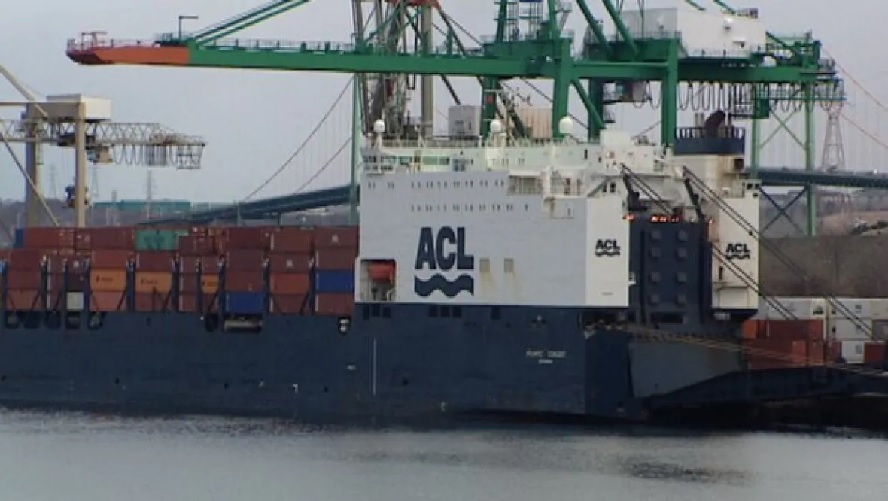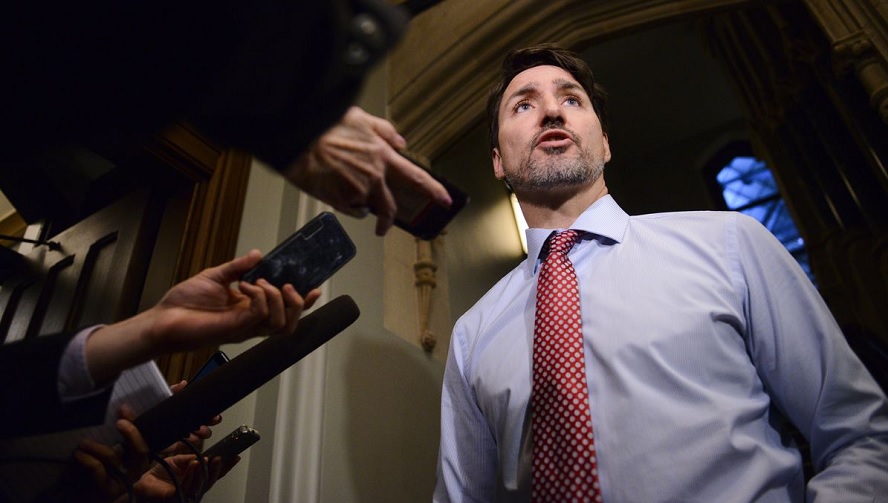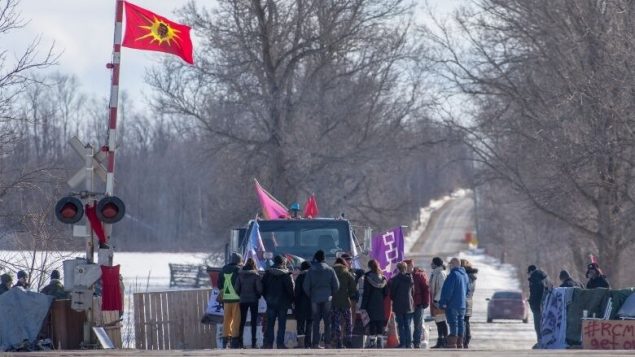The already intense criticism and pressure on the federal government is growing as rail blockades continue across the country over the issue of a natural gas pipeline across northern British Columbia..
While Prime Minister Trudeau continues to say the problem will be solved through dialogue and wants to meet with the small group of hereditary chiefs opposed to the pipeline, the group has said no talks will take place as long as the federal police are present at the pipeline site on their claimed territory.

As the economic consequences grow, Atlantic Container Lines has decided to divert its cargo from the Port of Halifax to the U.S. because of the rail blockades in Canada. The head of the Canadian Manufactureres and Exporters said yesterday that many of its members are suffering as they can neither receive or ship supplies and products. Farmers are concerned about perishable food goods as well (CBC)
In news just announced this morning, the Royal Canadian Mounted Police, have just offered to leave their temporary post on the forest road through the territory as a gesture of good faith. The head of the British Columbia RCMP also offered to meet with the Wet’suwet’en protesters, but they have responded they will only meet with the Prime Minister, and only after the RCMP and now all Coastal GasLink personnel leave their claimed territory.
Four of the dissenting chiefs are now in eastern Ontario to meet with members of the Mohawk who are blocking the major rail corridor near Belleville. It is said to be a meeting only to express thanks for their solidarity and not to seek a resolution to the blockades.

Purple indicates Wet’suwet’en claimed territory, Green indicates proposed pipeline route. Yellow arrow indicates site of the blockade protest (CBC)
Prime Minister Trudeau is meeting today with his cabinet to discuss the situation. A spokesman for the dissenters in northern B.C has also said, that even with an RCMP withdrawal, the earliest they could meet with politicians would be next week.
Majority of First Nations in favour
While a group of the Wet’suweten are opposed, some 20 indigenous groups have agreed to the line in exchange for millions of dollars in benefits and job guarantees. That includes most of the Wet’suwet’en according to one of the chiefs in favour.
Theresa Tait-Day, a hereditary chief of the Wet’suwet’en said in a tweet that 85 per cent of the band had voted in favour of the project.
Theresa Tait-Day, Hereditary Chief, Wet'suwet'en Nation
“In the case of #CoastalGasLink 85% of our people said yes they want this project.”#AllEyesOnWetsuweten #BuildCanadaUp#WetsuwetenStrong pic.twitter.com/bBU1yJLZgu
— Canada Action (@CanadaAction) February 10, 2020
As a result of the blockades Via Rail passenger rail service has laid off some 1,000 workers, while CN rail announced 450 workers laid off yesterday. There has been a resumption of some limited passenger and freight rail traffic across the country, although further blockades have interrupted that. The blockades by other indigenous groups and supporters of the opposing Wet’suwet’en have blocked more rail lines.
The passenger service between Montreal and Quebec City which resumed yesterday has been shut down again today.
Alberta Premier Jason Kenny said yesterday, “”These illegal blockades — there is people losing their jobs, blue-collar people, vulnerable people. What is happening here is anarchy.”

Prime Minister Justin Trudeau arrives to a caucus meeting on Parliament Hill in Ottawa on Wednesday. He said Thursday his cabinet is “working very hard” to end the ongoing rail blockades. He has been under ever increasing pressure from several sides to resolve this increasing crisis (Sean Kilpatrick/The Canadian Press)
Economy suffering
With vital freight services mostly halted, cargo on both coasts is piling up. More than 40 ships are parked off the west coast port of Vancouver, while in the east, there is no more room for containers in Halifax.
A major shipper announced today their cargo will now go to U.S. ports representing a huge economic loss to the port in Halifax.
Quebec Premier Francois Legault said the ‘illegal blockade’ must be ended within days, not weeks.
At a meeting in northern B.C, yesterday about 200 Wet’suwet’en gathered to express support for the pipeline. Quoted in the Vancouver Sun, a councillor with the Skin Tyee Band said, ““These protesters are getting one side of the story,” he said. “They want to stand up with their fists in the air, but I say come and listen to us and get the other side of the story before you go out there and stop traffic and stop the railroad”.
Additional information-sources
- Global News: S Boynton: Feb 20/20: B.C. RCMP open door to leaving Wet’suwet’en territory in effort to end rail blockades
- Vancouver Sun: D Carigg: Feb 19/20: Wet’suwet’en members speak in favour of Coastal GasLink pipeline
- CBC: P Withers: Feb 19/20: ‘Fed up’ shipping line diverts cargo from Halifax over rail shutdown
- Aboriginal Peoples Television Network : Jan 27/20: We’ve got a real divide in the community:’ Wet’suwet’en Nation in turmoil
- Burns Lake District News: B. McBride: Jan 2.20: LNG development a historic opportunity for First Nations, group says
- First Nations LNG Alliance : open letter to the United Nations Committee on the Elimination of Racial Discrimination
- Canadian Press (Ottawa Matters) Feb 19/20: Blockade on CN rail line in Edmonton removed, injunction granted







For reasons beyond our control, and for an undetermined period of time, our comment section is now closed. However, our social networks remain open to your contributions.